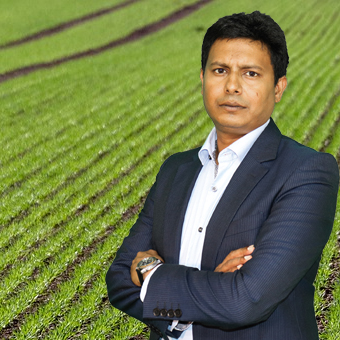The last time I wrote about agriculture in Mauritius, I mentioned how ‘dynasty politics’ has messed up that part of our economy. Maybe the Wuhan virus does have a silver lining when it comes to agriculture in Mauritius. But will Mauritians realise that or will we forget and carry on ‘business as usual’?
I personally think that most Mauritians will forget and we will get back to ‘business as usual’.
These past few months have shown us how important our food security and food supply chains are. Most of us have been buying vegetables and fruits from supermarkets and local sellers. I have never seen so many local vegetable and fruit sellers on the streets of Mauritius. Growers selling their own products directly to consumers. There was some abusive pricing at the beginning of the confinement but that has considerably subsided now that we are used to the new ‘normal’. Many of us have been buying from our local sellers who mostly get their vegetables from local growers and that is something that should carry on after this confinement is over.
Buying locally produced vegetables is also a great way to encourage local growers to sell locally instead of selling to middlemen that in turn sell to supermarkets and the latter sell to the consumers. The grower gets a better price for his/her vegetables and the consumer gets a price minus the middlemen’s hefty profit. Being in the food growing business, I have noticed that more growers have started selling directly to supermarkets thus making the middleman that little closer to being obsolete in the supply chain I am involved in.
We can talk about how detrimental middlemen are in a food supply chain and how it is the consumer and the grower that end up being the big losers. And we can also talk about food security in Mauritius and how we lack so much of that and we do poorly in that department because we import so much of what we consume. There will be some foods that have to be imported for sure but I think that in terms of vegetables, Mauritius can be self-sufficient. Being an island nation, we should be able to at least produce enough vegetables to supply all vegetable markets, all supermarkets, restaurants and hotels on the island.
Of course, we need to grow more to produce more and get to a point of self-sustenance.
One good thing that the government has done for growers is the construction of a central wholesale site for vegetables close to Wooton but there is no information as to when that will be operational. Lots more can be done by government to encourage ‘grow local and consume local’ which will be of great help when the next pandemic comes or some other problems that were initially predicted by scientists arise.
Agriculture is one of the most labour intensive work there is. With technology we can reduce manpower needed and increase productivity. The climate is also changing. Every year for the past 10-15 years has been hotter than the previous year. When it rains nowadays, it actually pours.
Extreme weather has also affected the way we grow our food.
This is where sheltered farming comes into play.
Despite preferential loans being offered by the DBM, and of course security/collateral needed unlike the Indian who does not need to give any security against a loan of USD $50 million from SBM or the minister who got 1 million Euros to buy gold, the weak incentives offered offer hardly any encouragement for someone to go into a business that might see his/her security being confiscated to be sold underhandedly by unscrupulous fellow Mauritians. Talk about a mafia style system from top to bottom.
Factor in the cost of the land that is needed because the DBM will finance the cost of the greenhouse/sheltered farming structure only. Greenhouse / sheltered farming is an expensive business to start up and needs a year or two (assuming you know what you are doing) to get going properly. But the financial structure surrounding the financing of such businesses does not allow the new grower any breathing space.
More can be done financially by the government to encourage protected farming. But are the dynasties actually interested in doing something to move the economy, have some food security and create jobs or are they happy with business as usual?
For sure a lot of things will not be ‘business as usual’ for the next year or so, but I was thinking more of the attitude of the dynasties. I do not think that they want to change anything at all.
I personally know people who have been thanked by dynasties for their help in general elections by being given a government owned agricultural plots of land on a long leases. Why not offer those plots to serious Mauritians willing to take out a loan from the DBM to start a sheltered farming business? Sheltered farming does not necessarily mean full greenhouses with solid bases and therefore could just consist of a structure to protect the plantation and would involve much less set up costs compared to full on greenhouses. Water can be collected when it rains using drains in the sheltered farming structure and stored for irrigation.
Give the ‘colleur l’affiches’ some money and/or a job if you have to and keep the land for the Mauritians that want to get into agriculture.
I wrote about industrial hemp in my previous article. Some call it ‘green gold’. From all the research done so far, this is the magic plant. Think what it would mean for Mauritius to produce the raw materials needed for the textile industry using industrial hemp. With so many applications, industrial hemp would create a new sector for the Mauritius economy and in doing so, we create jobs and we bring foreign currency into the country, the two basics of Mauritius economy.
This is the type of project that if managed properly with the appropriate regulations and laws in place would change our economy for the better. It is nice to dream of a Mauritius with no poverty; all supported by a universal basic salary for anyone over 16 years old or even younger. An economy supported by a plant that can replace plastics, a plant that allows us to produce bio diesel or methanol, build environmentally friendly homes, a plant that can be transformed into 2500 different ‘green’ products. To top it all up, the hemp plant is a very good carbon sink. It will absorb a lot of carbon dioxide. The Mauritius climate allows us to have a minimum of 2 industrial hemp harvests a year. We could get 3 harvests most likely. Sugar Cane gives us one harvest a year and every single sugar cane planted land owner I know (and I know quite a few) complains how planting sugar cane is a money loosing exercise for them.
But the dynasties are not interested in all of these. They want ‘business as usual’.







